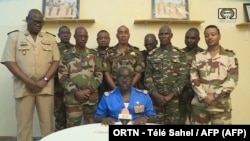The mutinous soldiers announced on state television late Wednesday that they had put an end to the government over the African country's deteriorating security. They said all institutions had been suspended and security forces were managing the situation, urging external partners not to interfere.
"This is as a result of the continuing degradation of the security situation, the bad economic and social governance," air force Col. Maj. Amadou Abdramane said on the video. Seated at a table in front of nine other officers, he said aerial and land borders were closed and a curfew was imposed until the situation stabilized.
The group, which is calling itself the National Council for the Safeguarding of the Country, said it remained committed to its engagements with the international and national community.
Niger's army command on Thursday declared its support of the takeover, saying its priority was to avoid destabilizing the country.
The army needed to "preserve the physical integrity" of the president and his family and avoid "a deadly confrontation... that could create a bloodbath and affect the security of the population," it said in a statement signed by the army chief of staff.
Amid fierce condemnation from African and international organizations and Niger's Western allies, Bazoum has stood his ground.
"The hard-won gains will be safeguarded," Bazoum said on Twitter, which is being rebranded as 'X.' "All Nigeriens who love democracy and freedom would want this."
The West African economic bloc ECOWAS, the African Union and others in the international community have condemned the events in Niger calling on the president to be freed immediately.
The United Nations Secretary-General voiced alarm Thursday at instability in the belt of Africa south of the Sahara, saying he is "extremely worried" about extremism and military upheaval bedeviling the Sahel.
"We are seeing a disturbing trend," Antonio Guterres told the media. "Successive unconstitutional changes of government are having terrible effects on the development and lives of civilian populations."
Niger Foreign Minister Hassoumi Massoudou said the country's "legal and legitimate power" was the one exercised by its elected president.
He told the France24 TV channel that Bazoum was "in good health."
There had been a "coup bid" but "the whole of the army was not involved," he stressed.
Earlier Wednesday, a tweet from the account of Niger’s presidency reported that members of the elite guard unit engaged in an “anti-Republican demonstration” and unsuccessfully tried to obtain support from other security forces. It said Bazoum and his family were doing well but that Niger’s army and national guard "are ready to attack" if those involved in the action did not back down.
The military takeover, the seventh in the West and Central Africa region since 2020, could further complicate Western efforts to help countries in the Sahel region fight a jihadist insurgency that has spread from Mali over the past decade.
Bazoum's election was the first democratic transition of power in a state that has witnessed four military coups since independence from France in 1960.
The African Union and West African regional bloc ECOWAS earlier on Wednesday condemned what they called an attempted coup d'etat.
The head of ECOWAS said Benin President Patrice Talon was heading to Niger in a mediation bid, after the latest bout of turbulence to hit the region.
President Talon was expected to arrive in Niamey Thursday to speak with both sides to resolve the crisis, after a meeting in Abuja Wednesday with Nigerian President Bola Ahmed Tinubu.
The Nigerian leader said President Talon would mediate with both the presidential guard and Bazoum with a view to finding an agreement.
The United States urged Bazoum's release, while the European Union, United Nations, France and others condemned the uprising and said they were following the events with concern.
U.S. Secretary of State Antony Blinken, who spoke with Bazoum on Wednesday when he was being held in the presidential palace, said the U.S. economic and security partnership with Niger depended on the continuation of democratic governance.
Information for this report came from Reuters, The Associated Press and AFP.

Forum